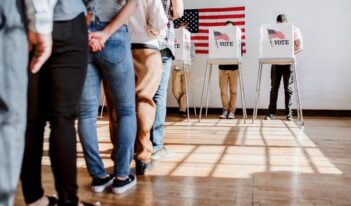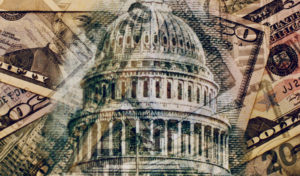
Republican states with major democratic metropolitan centers forestall local efforts to reform election law.
Shortly after the 2016 presidential election, I heard physicist Neil deGrasse Tyson joke that Florida color-coded its cities because its 2016 presidential electoral map was deep red except for most of its bright blue cities.
Like Florida, many so-called red states that voted Republican statewide in recent elections have blue cities—major metropolitan centers that tilt hard toward the Democratic Party. These blue cities in red states have to cope with the vagaries of home rule if they wish to reform local election laws—even in the area of campaign finance reform. City policymakers have to be specifically wary that the state legislature can swoop in and preempt good local laws that limit money in politics, which just happened in Florida.
“Home rule” is the name of the legal doctrine that determines when and if a locality has the authority to strike out on its own in a particular area of regulation. Home rule can be a bit of a misnomer because many localities do not have independence under their state’s constitution or statutory law and are thus unable to craft their own local laws and rules if the state wants to interfere and override local choices.
In many states, the controlling doctrine for local authority is called “Dillon’s Rule,” which is the opposite of the layperson’s conception of home rule and local autonomy. In states that follow Dillon’s Rule, local legislative power is limited to a specific list of enumerated powers. Invoking home rule in a state where Dillon’s Rule applies can be a snake in the grass for local reformers because it means they may not possess the power to enact local legal improvements.
Florida is a hybrid of home rule and Dillon’s Rule. Home rule for municipalities seems embodied by statute, but Florida’s Constitution states that counties “shall have all powers of local self-government not inconsistent with general law.” Thus, the Florida legislature can ultimately step in and unravel local reforms.
The fracas over who has the last regulatory word—the locality or the state—has played out across America in a broad range of topics, including gun control, plastic bags, municipal broadband, and election laws. Many red states have enacted laws that make local ordinances in blue cities on these topics preempted or nullified.
This state-versus-local turf battle has also emerged during the COVID-19 pandemic. For example, in Arkansas, a state law prevents localities from imposing mask mandates, a move the governor now regrets. But his regret alone will not remove this bad state law. The legislature has to return to the question and revoke the old law to allow localities to issue mask mandates if a locality concludes that it is in the best interest of its citizens. Until the state reverses course, each locality in Arkansas is bound by the law.
These home-rule fights have also reared up over election laws. In 2021, Florida joined a national trend of red states passing new, regressive voting laws in the wake of the 2020 election. Florida’s new election restrictions include limits on drop boxes for ballots and stricter rules for getting ballots by mail. These rules generated criticism in the press and spurred a series of lawsuits seeking to undo the new law filed by the NAACP, League of Women Voters of Florida, Harriet Tubman Freedom Fighters, and Florida Rising Together.
But another change in Florida’s election laws in 2021 garnered far less attention—a change to the state’s campaign finance laws. The new law, known as SB 1890, guts local campaign finance contribution limits that are different than—read, lower than—the state’s campaign contribution limits. This state law makes the contribution limit $1,000 all across Florida, even in elections for local offices. SB 1890 guts and displaces laws in localities in Florida that used to have lower contribution limits for local offices such as mayor, sheriff, or city council. For instance, the law eliminated Tallahassee’s $250 contribution limit and Sarasota’s $200 contribution limit.
Campaign finance laws such as Florida’s SB 1890 rob localities of the ability to curb money in politics or to tailor contribution limits to the size and cost of local elections. Raising contribution limits across the board is a boon for the wealthy donor class who will be able to flex more spending power in every election in the state.
Elevating local limits may also reduce the competitiveness of municipal elections and act as an incumbent protection racket since those already in office will have the ability to raise more money from their existing donor base. This new Florida law may also render local elected office out of the reach of first-time candidates and would-be challengers who are easily daunted by the political war chests of those already in power—an obstacle especially for nontraditional candidates such as women and people of color. Those local war chests in Florida are likely to be bigger under the new statewide law since local incumbents can now raise four or five times as much money from each affluent political donor.
What happens in state capitols does not stay in state capitols. Rather, new state laws can ruin hard-fought progressive reforms in cities all across a state. State-level preemption of local regulation can be bad for public health, as Americans have seen during the pandemic, and it can also be bad for the health of democracy and the integrity of future elections.
This essay is part of a seven-part series, entitled Regulating Elections in the United States.




